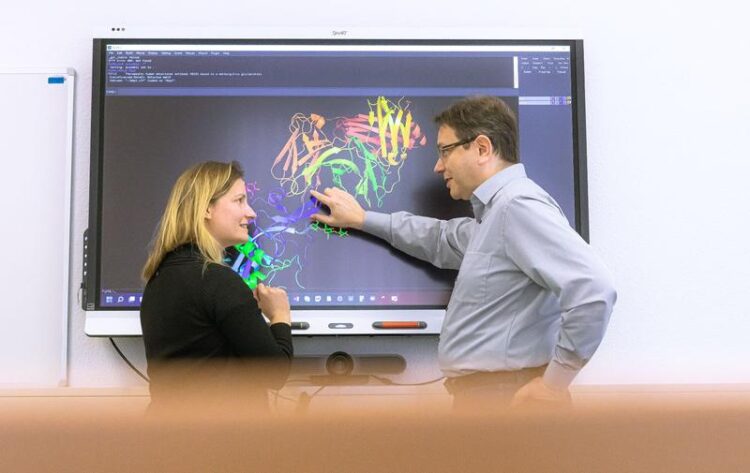Building a ‘vaccine library’ to prevent future pandemics

Humboldt-Prof. Dr. Jens Meiler and Dr. Clara T. Schoeder analyse protein structures.
Photo: Swen Reichhold
The Institute for Drug Discovery led by Humboldt Professor Jens Meiler is to receive 1.9 million dollars (1.77 million euros) for the development of vaccines.
The international Coalition for Epidemic Preparedness Innovations (CEPI) will fund computer-aided vaccine development at Leipzig University with the aim of building a digital ‘vaccine library’ of components and virtual antigen designs. Using classical and AI-based software, vaccine candidates will be designed for ten priority virus families with epidemic and pandemic potential, with the aim of developing a potential vaccine in the shortest possible time in the event that a new viral threat emerges.
Social upheavals such as globalisation, urbanisation and climate change promote and increase the likelihood and frequency of viral outbreaks that could lead to new pandemics. With the outbreak and spread of the SARS-CoV-2 virus, the world experienced the existential and long-lasting impact that viral mutation can have. To be better prepared for a future pandemic, CEPI is investing in a research project to develop novel antigen designs at the Institute of Drug Discovery at the Faculty of Medicine. The team, led by director and Humboldt Professor Jens Meiler, is focusing on ten known virus families to build the ‘vaccine library’ and is using the computer-based Rosetta platform for its research. “Rosetta is a dynamic and evolving software system that deals with the prediction and design of biomolecular structures. We are using Rosetta to design compounds that don’t exist in nature. It’s very creative,” explains Professor Meiler, continuing: “We’re building a vaccine library that clinical developers will then be able to draw from.”
For the sponsor CEPI, an egalitarian approach is a prerequisite for this project: partners and developers provide their knowledge in one ‘vaccine library’ and can take knowledge from another. “In this research project, we are basically learning what we can improve in vaccine design in order to develop vaccines better and, above all, faster in the future. To do this, we use computer-aided design, including machine learning, to optimise protein design. This means that we train with the programme and learn what we can already design well and where we need to adapt our programmes further,” explains project leader Dr Clara T. Schoeder, who will take up a junior professorship in the development of immunotherapeutics at Leipzig’s Faculty of Medicine on 1 July 2023.
The research project is scheduled to run for five years. A working group from Houston Methodist Hospital in Texas is also a partner in the project and is in contact with Dr Schoeder’s research group. Preliminary results are expected in late 2023 or early 2024. In an in-depth interview, Dr Schoeder talks about her research and the impact of artificial intelligence on vaccine development.
In addition, both Professor Meiler and Dr Schoeder recently became members of ScaDS.AI, the Center for Scalable Data Analysis and Artificial Intelligence, which is a research centre for data science, artificial intelligence and big data with sites in Leipzig and Dresden.
Sponsor CEPI is an innovative global partnership working to accelerate the development of vaccines against epidemic and pandemic threats.
Wissenschaftliche Ansprechpartner:
Dr. Clara T. Schoeder, pharmacist
Junior Research Group Leader
Institute for Drug Discovery, Leipzig University, Faculty of Medicine
Tel: +49 (0) 341-97-25756
E-Mail: clara.schoeder@medizin.uni-leipzig.de
Weitere Informationen:
https://www.uniklinikum-leipzig.de/einrichtungen/wirkstoffentwicklung
https://cepi.net/news_cepi/machine-vs-nature-new-machine-learning-platform-to-ac…
Media Contact
All latest news from the category: Health and Medicine
This subject area encompasses research and studies in the field of human medicine.
Among the wide-ranging list of topics covered here are anesthesiology, anatomy, surgery, human genetics, hygiene and environmental medicine, internal medicine, neurology, pharmacology, physiology, urology and dental medicine.
Newest articles

High-energy-density aqueous battery based on halogen multi-electron transfer
Traditional non-aqueous lithium-ion batteries have a high energy density, but their safety is compromised due to the flammable organic electrolytes they utilize. Aqueous batteries use water as the solvent for…

First-ever combined heart pump and pig kidney transplant
…gives new hope to patient with terminal illness. Surgeons at NYU Langone Health performed the first-ever combined mechanical heart pump and gene-edited pig kidney transplant surgery in a 54-year-old woman…

Biophysics: Testing how well biomarkers work
LMU researchers have developed a method to determine how reliably target proteins can be labeled using super-resolution fluorescence microscopy. Modern microscopy techniques make it possible to examine the inner workings…





















